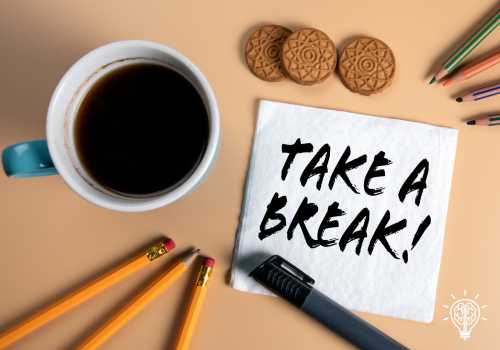What are breaks?
Importance of Breaks for Productivity: Breaks are deliberate pauses in activity, allowing for mental and physical rest. Whether in an educational setting or workplace, breaks help mitigate fatigue, restore concentration, and enhance overall performance.
Why are breaks important for effective task completion?
Breaks play a critical role in enhancing task completion by:
- Restoring Attention: Continuous work can lead to attention drift and reduced cognitive performance. Breaks help reset the mind, maintaining a high level of focus necessary for task completion.
- Boosting Creativity: Stepping away from work momentarily can foster creativity. Breaks provide the mental space needed for subconscious processing, often leading to insights and innovative solutions upon return.
- Preventing Burnout: Regular breaks reduce the risk of burnout caused by sustained mental effort, thus sustaining productivity over longer periods.
- Enhancing Decision-Making: Fatigue can impair judgment and decision-making abilities. Breaks allow the brain to rest, improving cognitive function and decision quality.
- Improving Physical Health: Sitting for long periods can have detrimental health effects. Breaks involving physical movement promote better circulation and can prevent strain and discomfort, keeping you physically primed for work.
What is the importance of breaks for productivity and focus?
Implementing regular breaks can significantly enhance productivity and focus by:
- Increasing Engagement: Refreshed mentally and physically, individuals are more engaged and less prone to errors.
- Managing Stress: Breaks provide an opportunity to reduce stress, which can improve overall mental health and productivity.
- Maintaining Long-term Performance: Consistently taking breaks helps maintain performance throughout the day without significant drops in efficiency.
- Optimizing Work Pacing: Knowing there is a scheduled break coming up can encourage a more focused effort in anticipation of a rest period.
What are some strategies and techniques to take effective breaks?
To maximize the benefits of breaks in increasing productivity, consider the following strategies:
- Timed Breaks: Use techniques like the Pomodoro Technique, where you work for focused intervals (typically 25 minutes) followed by a 5-minute break. After four cycles, take a longer break of 15-30 minutes.
- Physical Activity: Engage in light physical activities during breaks such as stretching, walking, or a brief yoga session. This helps in reducing physical strain and refreshing the mind.
- Mental Diversions: Engage in activities completely unrelated to work during breaks, such as reading a book, meditating, or practicing a hobby. This helps in mental recovery and returning to tasks with a new perspective.
- Social Breaks: Interact with colleagues or friends during breaks, if possible. Social interaction can boost mood and relieve stress.
- Nature Breaks: Spend time in nature or view natural scenes, which can reduce stress and enhance mood and cognitive functioning.
These techniques ensure that breaks are not only restorative but also contribute positively to your work performance and overall well-being.




